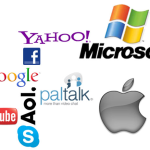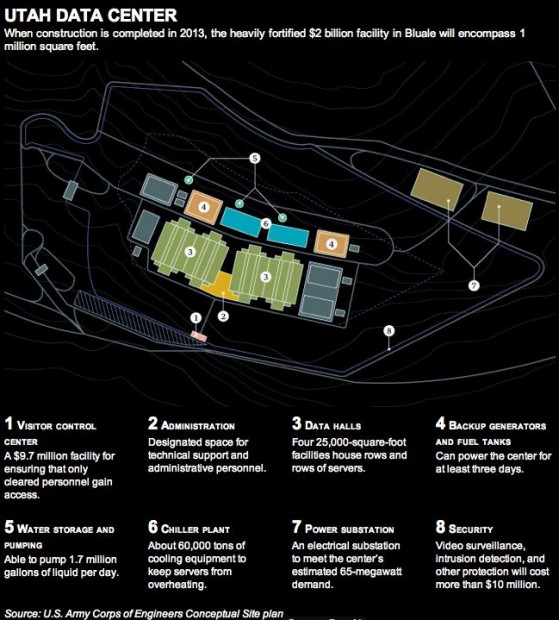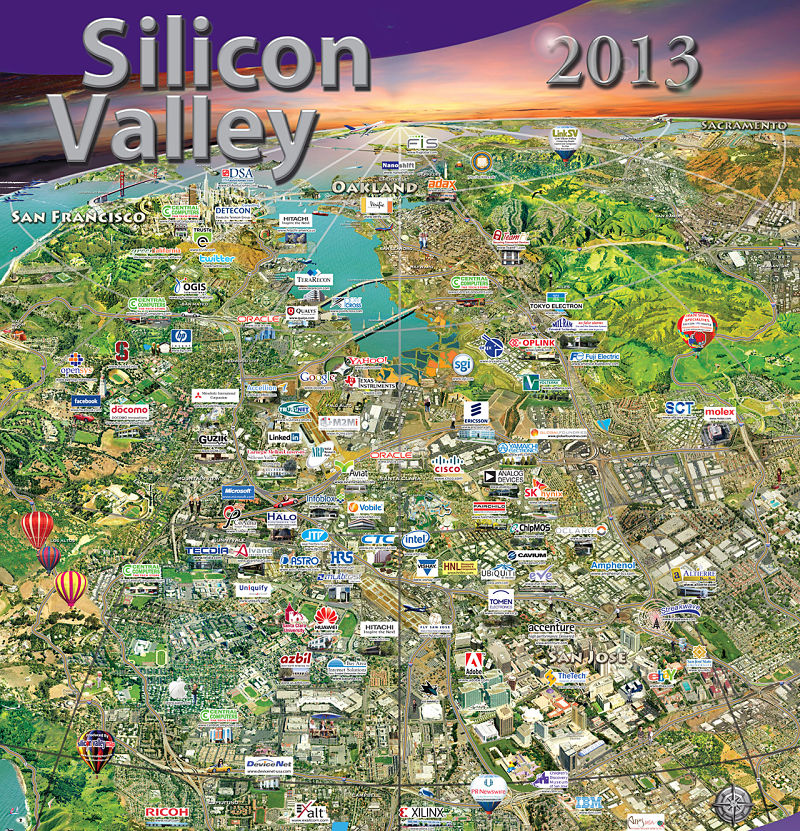It’s an open secret that Steve Jobs had a green badge with the CIA, and if Steve (I’m a fan by-the-way) had a badge makes you wonder who else…
May be time for America to re-think its priorities when it comes to spying on citizens, period. I don’t think too many people are ok with giving up a batch of civil liberties in exchange for Washington’s “blue pill.” And what about holding Silicone Valley accountable? Who’s asking the hard questions? Apple, Google, Facebook, Yahoo and the others need to start pushing back a bit on Uncle Sam or they’re going to start losing what little trust consumers have, and this translates to the bottom line.
I’d personally trust Steve Jobs any day, but very few of the others. The true litmus test for me is to ask myself, what would the founding fathers of the United States of America think of all of this?
How America’s Top Tech Companies Created the Surveillance State
 With Edward Snowden on the run in Russia and reportedly threatening to unveil the entire “blueprint” for National Security Agency surveillance, there’s probably as much terror in Silicon Valley as in Washington about what he might expose. The reaction so far from private industry about the part it has played in helping the government spy on Americans has ranged from outraged denial to total silence. Facebook’s Mark Zuckerberg, he of the teen-nerd hoodie, said he’d never even heard of the kind of data-mining that the NSA leaker described—then fell quiet. Google cofounder Larry Page declared almost exactly the same thing; then he shut up, too. Especially for the libertarian geniuses of Silicon Valley, who take pride in their distance (both physically and philosophically) from Washington, the image-curdling idea that they might be secretly in bed with government spooks induced an even greater reluctance to talk, perhaps, than the Foreign Intelligence Surveillance Act, which conveniently forbids executives from revealing government requests for information.
With Edward Snowden on the run in Russia and reportedly threatening to unveil the entire “blueprint” for National Security Agency surveillance, there’s probably as much terror in Silicon Valley as in Washington about what he might expose. The reaction so far from private industry about the part it has played in helping the government spy on Americans has ranged from outraged denial to total silence. Facebook’s Mark Zuckerberg, he of the teen-nerd hoodie, said he’d never even heard of the kind of data-mining that the NSA leaker described—then fell quiet. Google cofounder Larry Page declared almost exactly the same thing; then he shut up, too. Especially for the libertarian geniuses of Silicon Valley, who take pride in their distance (both physically and philosophically) from Washington, the image-curdling idea that they might be secretly in bed with government spooks induced an even greater reluctance to talk, perhaps, than the Foreign Intelligence Surveillance Act, which conveniently forbids executives from revealing government requests for information.
But the sounds of silence from the tech and telecom sectors are drowning out a larger truth, one that some of Snowden’s documents might well supply in much greater detail. For nearly 20 years, many of these companies—indeed most of America’s biggest corporate sectors, from energy to finance to telecom to computers—have been doing the intelligence community’s bidding, as America’s spy and homeland-security agencies have bored their way into the nation’s privately run digital and electronic infrastructure. Sometimes this has happened after initial resistance, and occasionally under penalty of law, but more often with willing and even eager cooperation. Indeed, the private tech sector effectively built the NSA’s surveillance system, and got rich doing it.
Books have been written about President Eisenhower’s famous farewell warning in 1961 about the “military-industrial complex,” and what he described as its “unwarranted influence.” But an even greater leviathan today, one that the public knows little about, is the “intelligence-industrial complex.”
The saga of the private sector’s involvement in the NSA’s scheme for permanent mass surveillance is long, complex, and sometimes contentious. Often, in ways that appeared to apply indirect pressure on industry, the NSA has demanded, and received, approval authority—veto power, basically—over telecom mergers and the lifting of export controls on software. The tech industry, in more than a decade of working-group meetings, has hashed out an understanding with the intelligence community over greater NSA access to their systems, including the nation’s major servers (although it is not yet clear to what degree the agency had direct access). “I never saw [the NSA] come and say, ‘We’ll do this if you do that,’ ” says Rebecca Gould, the former vice president for public policy at Dell. “But the National Security Agency always reached out to companies, bringing them in. There are working groups going on as we speak.”
Indeed, the cooperation was usually “voluntary” in large part because companies couldn’t afford to seem uncooperative, says another private-sector official who would speak about classified issues only on condition of anonymity. “The ways that pressure works in Washington are very subtle,” he says. “No one’s getting bribed, or punished outright. But it’s the good little Indian that gets rewarded. And these companies needed the goodwill of the NSA and other agencies.”
Jeffrey Smith, a former general counsel at the CIA, says, “Generally as the IT community matured in this country, a number of things happened. They all opened Washington offices … and they came to an understanding, after some initial arrogance, that they needed to deal with the government.” The companies also came to understand that, in a very real way, they were now part of the nation’s infrastructure, and they would need plenty of help from the government in securing it.
So for the tech and telecommunications industries, the relationship has always been a delicate balance of patriotism and public image, and a public-relations tightrope walk between getting along and appearing not to bend to the NSA’s demands. “They have been, on the whole, cooperative,” says Greg Garcia, who served as the Homeland Security Department’s first Internet czar under President George W. Bush. “But at the same time, they are wary of being seen as instruments of the government.”
That wariness continues. The tech companies appear to understand that by keeping the whole process of cooperation supersecret, they have jeopardized their reputations, and possibly violated the law. After the first stories about the NSA’s “Prism” Internet surveillance program came out in The Guardian and The Washington Post in June, identifying some of the most recognizable names in American corporate culture—Apple, Microsoft, Google, Facebook, Yahoo, and AOL, among others—as having negotiated arrangements with government surveillance agencies, executives at some of these tech companies expressed surprise at the extent of the program. But on July 18, these same companies—among many others, including Reddit, Twitter, and Tumblr—sent a letter to President Obama and senior intelligence and oversight officials in the executive branch and Congress asking permission to make public the number of government requests for information about their users, as well as the number of individuals, accounts, or devices for which information is requested.
Already have an account? Sign In
Two ways to continue to read this article.
Subscribe
$1.99
every 4 weeks
- Unlimited access to all articles
- Support independent journalism
- Ad-free reading experience
Subscribe Now
Recurring Monthly. Cancel Anytime.
Company officials are also appealing to the Foreign Intelligence Surveillance Court to let them tell their side of the tale. In some cases, they want to show they were ultracautious about what they let the government see. Yahoo, for example, is asking a judge to declassify information about Prism from a 2008 case, in which the company challenged the NSA’s surveillance proposals but was overruled by the FISA court.
One of the more recent reports from The Guardian, which has had unique access to NSA documents because of the personal relationship between its correspondent Glenn Greenwald and Snowden, said Microsoft “has collaborated closely with U.S. intelligence services to allow users’ communications to be intercepted, including helping the National Security Agency to circumvent the company’s own encryption.” The documents show, among other things, that Microsoft effectively helped the NSA bypass the company’s own security features so the agency would be better able to intercept Web chats on the new Outlook.com portal.

In an interview with National Journal, former NSA Director Michael Hayden indirectly confirmed Microsoft’s involvement. “This is a home game for us,” Hayden says. “Are we not going to take advantage that so much of it goes through Redmond, Washington? Why would we not turn the most powerful telecommunications and computing management structure on the planet to our use?”
Most of this co-opting of the private sector has happened with the full-throated support of both Republicans and Democrats in Congress, again behind closed doors. Today, Hayden says, the agency itself is all but indistinguishable from the private sector it has exploited. Its best technology is designed by the private sector—“There isn’t a phone or computer at Fort Meade that the government owns,” he says—and its surveillance systems are virtually interwoven with their products. The huge controversy over Snowden’s employment by one of these private contractors, Booz Allen Hamilton, was just the barest tip of the iceberg, according to intelligence and industry officials. One by one, Hayden says, the NSA contracted with companies to “make them part of our team,” as he puts it.
Among these contributing companies reportedly is Palantir Technologies, the Palo Alto, Calif., company thatThe New York Times and other news outlets have identified as a close associate of the NSA. Another is Eagle Alliance, a joint venture of Computer Sciences and Northrop Grumman that runs the NSA’s IT program and describes itself on its website as “the Intelligence Community’s premier Information Technology Managed Services provider.” Because of these close relationships, no door revolves more quickly in Washington than the one between these companies and the intelligence community. Booz Allen’s current vice chairman, Mike McConnell, was director of national intelligence in the George W. Bush administration and, before that, director of the NSA. The current director of national intelligence, James Clapper, is also a former Booz Allen executive.
Read the rest on the National Journal here.
(Featured Image Courtesy: siliconvalleymap.com)












COMMENTS